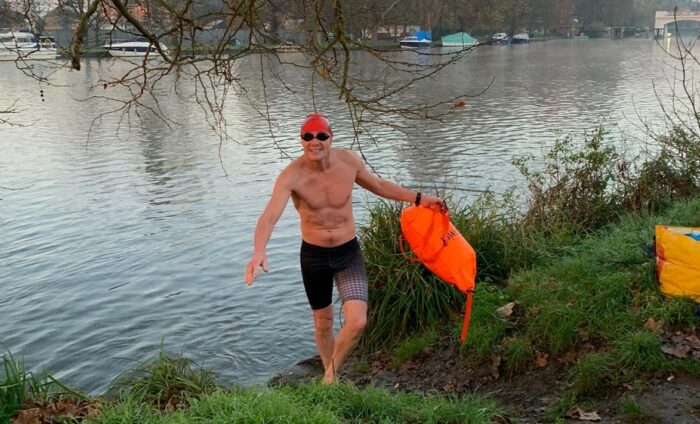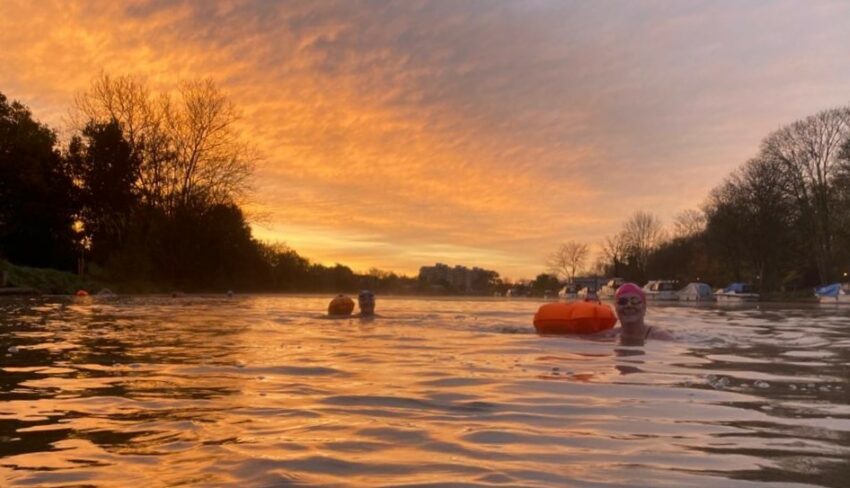
How to ditch your wetsuit for winter swimming
“For a 10-minute winter swim, I’m not sure wearing a wetsuit is worth it. What do you think?” Simon Griffiths answers this reader question
As the water gets colder and your swims get shorter, there does seem to be a point where the comfort and warmth benefits of wearing a wetsuit are outweighed by the faff factor of getting it on and off, and later dealing with a cold and damp wetsuit. But where that point is, will be quite personal.
It’s worth taking a step back and reflecting briefly on why you are swimming outside in winter. There are of course exceptions, but swimming for long enough without a wetsuit to maintain fitness in typical UK winter water temperatures would be dangerous and irresponsible. A full wetsuit, possibly with rash vest underneath, a neoprene hat and possibly gloves and booties might enable you to swim for longer, and possibly retain your swimming fitness, if you think it’s worth the effort.
However, there are many other reasons than fitness to swim outside in winter. It can be fun (yes, really), you may get to see spectacular sunrises, it’s a mental and physical challenge, it’s a self-confidence booster and it can make you feel good all day. In addition, there is a growing belief – backed by anecdotal evidence – that cold water swimming helps support your mental health.
These benefits can be achieved with short dips. There is no need to pull on a wetsuit to stay in the water longer to get them. In fact, the wetsuit may detract from the experience. But if you had any notion of staying fit through winter swimming, you will have to abandon them with your wetsuit.

This raises the question, if you’re used to wearing a wetsuit, how do you ditch it?
I’m normally a wetsuit swimmer, but a few winters ago I set myself a challenge to swim in the river every day, without a wetsuit. The water temperature was about 11 degrees when I started and dropped to less than 8 at the end.
Based on that (and many years of publishing Outdoor Swimmer magazine and observing other winter swimmers), here’s what I’d advise if you want to ditch your wetsuit:
- Embrace the winter swimming experience for what it is.
- Make sure you know about cold water shock, swim failure, hypothermia and after-drop. Refer to the winter swimming section on our website.
- Plan your warm-up strategy before you swim. It’s best to dress quickly, as soon as you exit the water, with lots of easy-to-put-on layers. Get them ready to put on, in the right order, before you swim.
- Prepare a warm drink for after your swim.
- Find somewhere safe to swim and someone responsible to swim with you or to keep an eye on you while you swim.
- Keep warm before you swim. Get undressed at the final moment before entering the water.
- Enter the water steadily and purposefully. Don’t jump or dive, but also don’t spend so long doing it that you’ve got cold before you start.
- The first time you do this, it will hurt. You will find it hard to believe you can bear the pain. Be patient and breathe. The pain will pass. As you do more swims, this initial pain decreases.
- Keep your swims short, even if you feel you can stay in the water for longer.
I’ve refrained from giving guidance on how long you should stay in the water as everyone is different. Start with a couple of minutes and see how it goes and how quickly you warm up again afterwards.
One thing I have noticed is that if you get into cold water in a wetsuit, the pain in your hands and feet can be intense. I always feared I would feel this pain over my whole body if I removed the wetsuit. I was happy, and relieved, to discover this wasn’t the case. In addition, I experienced less pain in my hands and feet when I removed the wetsuit.
There really isn’t any magic trick to ditching your wetsuit other than leaving it home and embracing the cold. Just remember, the first couple of minutes and your first few swims will be the hardest. It doesn’t take long to adapt. Enjoy the process and let us know how you get on.
If you’ve got a burning question about outdoor swimming, please send it to us: info@outdoorswimmer.com








